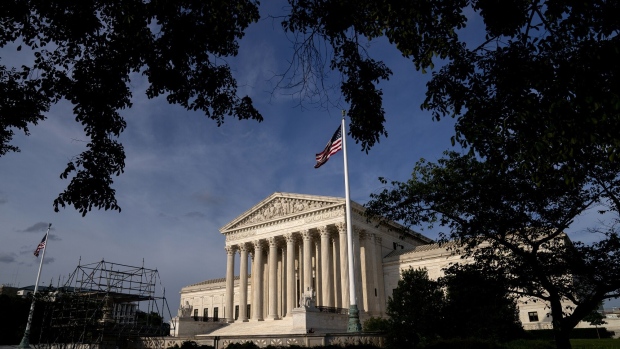Apr 16, 2024
Supreme Court Questions Jan. 6 Riot Charge in Case That Could Affect Trump
, Bloomberg News

(Bloomberg) -- The US Supreme Court voiced concern about a criminal charge levied against hundreds of Jan. 6 Capitol riot defendants, as the justices weighed a case that could affect the election-interference prosecution of former President Donald Trump.
Hearing arguments Tuesday on an appeal by Jan. 6 defendant Joseph Fischer, the justices took their most direct look yet at the deadly events that occurred across the street from their courthouse after the 2020 election.
At issue is a 2002 law that grew out of the Enron Corp. collapse and authorizes up to a 20-year sentence for people who obstruct an official proceeding. Some justices indicated they read the law as focusing on evidence destruction, worrying aloud that the Justice Department’s broader interpretation could have sweeping consequences.
“Would a sit-in that disrupts a trial or access to a federal courthouse qualify?” Justice Neil Gorsuch asked. “Would a heckler in today’s audience qualify, or at the State of the Union address? Would pulling a fire alarm before a vote qualify for 20 years in federal prison?”
A ruling for Fischer could give Trump new grounds to seek dismissal of two of the four counts in the federal prosecution against him for trying to overturn his 2020 election loss. The high court next week will consider Trump’s claim that he is immune from prosecution altogether in the Washington case, one of four sets of criminal charges he is battling as he heads toward a November rematch with President Joe Biden.
Beyond Trump, the Fischer case could have a major impact on the prosecution of people who stormed the Capitol while Congress was meeting to certify Joe Biden’s victory in the 2020 election. Prosecutors have invoked the law in more than 350 Capitol riot cases, with 120 defendants so far being convicted and sentenced under the provision, according to a summary released this month.
Enron Law
The law applies to a person who corruptly “alters, destroys, mutilates, or conceals a record, document, or other object” with the intent to undermine an official proceeding. A second prong — the one being invoked against Fischer and other Jan. 6 defendants — applies to anyone who “otherwise obstructs, influences, or impedes any official proceeding.”
Solicitor General Elizabeth Prelogar, the Biden administration’s top Supreme Court lawyer, told the justices that the statutory language clearly applies to people who stormed the Capitol as Congress was meeting.
“Many crimes occurred that day, but in plain English the fundamental wrong committed by many of the rioters, including petitioner, was a deliberate attempt to stop the joint session of Congress from certifying the results of the election,” she said.
But she drew pushback even from liberal Justice Ketanji Brown Jackson, who said Congress enacted the law in the “real-world context” of Enron and the document destruction that was part of that scandal.
“There was nothing as far as I can tell in the enactment history as it was recorded that suggests that Congress was thinking about obstruction more generally,” Jackson said. “They had this particular problem and it was destruction of information that could have otherwise been used in an official proceeding.”
Possible Compromise
Jackson joined Justice Amy Coney Barrett in hinting at a possible middle ground that would allow charges against Jan. 6 defendants whose actions could be connected to the electoral certificates that Congress was scheduled to count that day.
Barrett asked Fischer’s lawyer, Jeffrey Green, whether his client could be prosecuted for trying to “obstruct the arrival of the certificates.”
Green responded that “attempting to stop a vote count or something like that is a very different act than actually changing a document or altering a document or creating a fake new document.”
Green’s argument suggested that, even if Fischer wins his case, Trump could remain vulnerable under the law. The Trump indictment accuses the former president of trying to use fraudulent electoral certificates to stay in power, and Special Counsel Jack Smith says the charges will be valid no matter how the Supreme Court rules in the Fischer case.
Another liberal, Justice Elena Kagan, said Tuesday that Congress was focused on more than documents. “It was a provision that was meant to function as a backstop.”
“Congress had all these statutes all over the place,” Kagan added. “What Enron convinced them of was that there were gaps in the statutes and they tried to fill the gaps.”
Before the Jan. 6, 2021, riot, Fischer allegedly sent text messages advocating violence, including one that said “If Trump don’t get in we better get to war.” He is accused of assaulting at least one police officer during the riot.
Fischer says he arrived at the Capitol grounds after Congress had recessed and wasn’t part of the mob that forced the certification to stop.
The case is Fischer v. United States, 23-5572.
--With assistance from Sabrina Willmer.
(Updates with comments from lawyers and justices starting in eighth paragraph.)
©2024 Bloomberg L.P.







